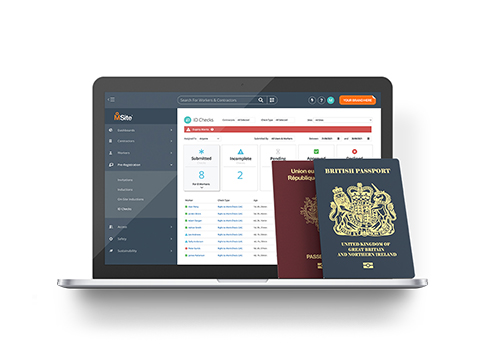
Tackling modern slavery in construction through simplified workforce identity checks
With cases of modern slavery in the UK construction sector on the rise, the need to tackle this serious crime - often undetected and driven by organised criminals - has never been more important.
Modern slavery and human trafficking figures reveal almost 8,000 referrals were made for potential victims in the UK in 2022, an increase of 10% on the previous year. And 30% of all victim referrals were related to labour exploitation.
The problem is a huge worry in the construction industry, one of the UK’s largest economic sectors, employing an estimated 2.2 million workers in 2020. Strategies to identify potential victims have included using identity checks on building sites and ensuring staff are legally able to work in the UK.
What is modern slavery in construction?
Human traffickers and illegal or unlicensed gangmasters target many industries, including construction, using workers they exploit to perform jobs against their will.
The National Crime Agency (NCA) reported 141 cases of potential exploitation in UK construction in 2022, based on reports made to the government’s modern slavery helpline. That was an annual increase of 53%, involving a potential 543 victims.
The NCA believes the dynamic nature of construction can mean workers join and leave projects throughout each life-cycle, making it challenging to identify the most vulnerable workers.
The threat of modern slavery can exist through the infiltration of large or national projects, involving infrastructure and industrial construction, or through small-scale and public-facing residential or casual construction projects.
Conducting a construction right to work check
All employers must check that a job applicant is allowed to work in the UK before they can start.
Employing someone who does not have the right to work and failing to make the correct checks could lead to a potential civil penalty or fine of up to £60,000 for each illegal worker.
Construction firms can carry out a right to work check by:
- Using the potential employee’s date of birth and right to work share code, where applicable, to check online through the Home Office
- Checking and making copies of their original documents, such as their passport or passport card
- Using a digital identity service to upload essential documentation via a service such as MSite Enhanced Vetting.
Using a contractor vetting service to check a right to work

As well as the financial penalties involved, the reputational damage to businesses that fail to properly check a worker’s right to work documentation can be severe.
And with the potential risks involved in hiring unqualified workers, who can be a danger to themselves and others, conducting rigorous background checks are essential - but they can be time-consuming.
Our Enhanced Vetting service lets contractors upload all relevant identity and qualification documents to an online portal, allowing for detailed checks before the employment progresses.
Reduce modern slavery in construction with MSite Enhanced Vetting
Ensuring worker transparency and accountability through verifying their identity and skills - along with real-time monitoring - can help to tackle modern slavery in construction.
Our Enhanced Contractor Vetting service helps those in the construction supply chain to guarantee all workers are fully qualified and legally able to work on a building site through several easy steps:
- Right to work checks: Workers will be told which documents they need to bring on day one - employers can easily upload these to the person’s profile
- Employees can pre-register themselves online using the MSite platform - saving time and money as they can quickly start work on their first day after site orientation
- Sub-contractors can upload documentation to ensure their workers arrive on site registered and inducted
- The level of vetting can be tailored to different roles, allowing for stricter checks for work needing specific or higher-level qualifications
- Insisting that workers have genuine Construction Skills Certification Scheme (CSCS) cards
- Comply with the government’s right to work procedures through the support of share codes and Frontier Worker Permits
- Choose a nominated manager to physically inspect and upload worker documents and certificates to ensure a swift and smooth process
- Keep employees’ details as up-to-date as possible on our secure cloud-based system by replacing and updating when documents or qualifications change
- Complete enhanced verification checks for workers on sensitive sites, for example creating a DBS check workflow for school construction projects
Signs of modern slavery in construction
The Chartered Institute of Building reported that the construction sector is recognised around the world as one of the highest-risk industries for workers to be exploited in forced labour.
It highlighted the importance of construction companies taking meaningful action to prevent such crime from being committed within their operations.
The UK charity Unseen, which supports survivors of trafficking and modern slavery, explains some of the most common signs of such exploitation:
- Signs of psychological or physical abuse
- Appearing frightened, withdrawn or confused
- They appear not to be free to move or are always accompanied
- They’re transported to and from work, perhaps with a number of people in one vehicle
- Lack protective equipment, suitable clothing or training to safely do their job
- Their legitimate wages may be taken by the person exploiting them
If you suspect someone might be a victim you can report to:
- Local police by calling 101 or 999 if there is an immediate risk of harm or danger
- The Modern Slavery & Exploitation Helpline
Modern slavery statements in construction
Organisations with turnovers of £36m or more are legally required to produce an annual modern slavery statement under the Modern Slavery Act 2015.
They must explain the steps they have taken to address and prevent modern slavery in their operations and supply chains. The statement must be updated annually and be readily available on their website.
Modern slavery statements in construction
Avoid costly fines and help stamp out modern slavery in construction through MSite's reliable, safety-enhancing contractor vetting and workforce management tools by booking a demonstration today. Our experts have a range of dates and times available. You can also visit our contact page and fill out our contact form.
Discover more MSite and Galliford Try success stories
Click for more information about our work with Galliford Try’s on their Monk Bridge development project.
